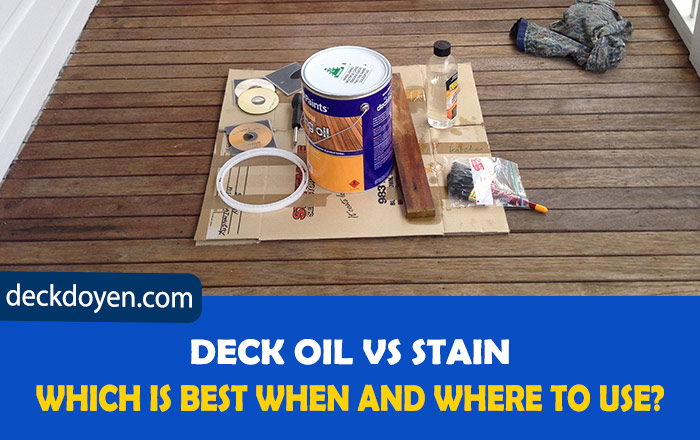To replenish the beauty of your composite, plastic, or wood deck floors. You need to use deck oils and stains. Deck oil and deck stains are perfect for renewing your deck floor and making them last longer. However, you might be wondering which will benefit your deck floor. You may also want to know when to use them.
Deck oils are uniquely refined oils that replenish and protect your deck floor. It fights against harmful moisture, UV rays, and microorganisms for your deck planks. On the other hand, deck stains are highly pigmented oils suitable to color your deck floors. It helps increase the durability of your deck and delays the need for replacement.
Both deck maintenance liquids are easy to apply and protective for planks. However, they have different pros and cons. These pros and cons affect the variability of their usage too. Therefore, I have listed the comparative advantages, uses, and disadvantages of deck stains and oils. So, you must give it a read to maintain your deck floor for decades in a better way.
What Are The Comparative Benefits Of Deck Oil V/s Deck Stain?
If you’re a deck owner, maybe you are looking for comparative benefits of any maintenance program for your deck that can be staining or oiling. The differences between them are pretty same but considerable.
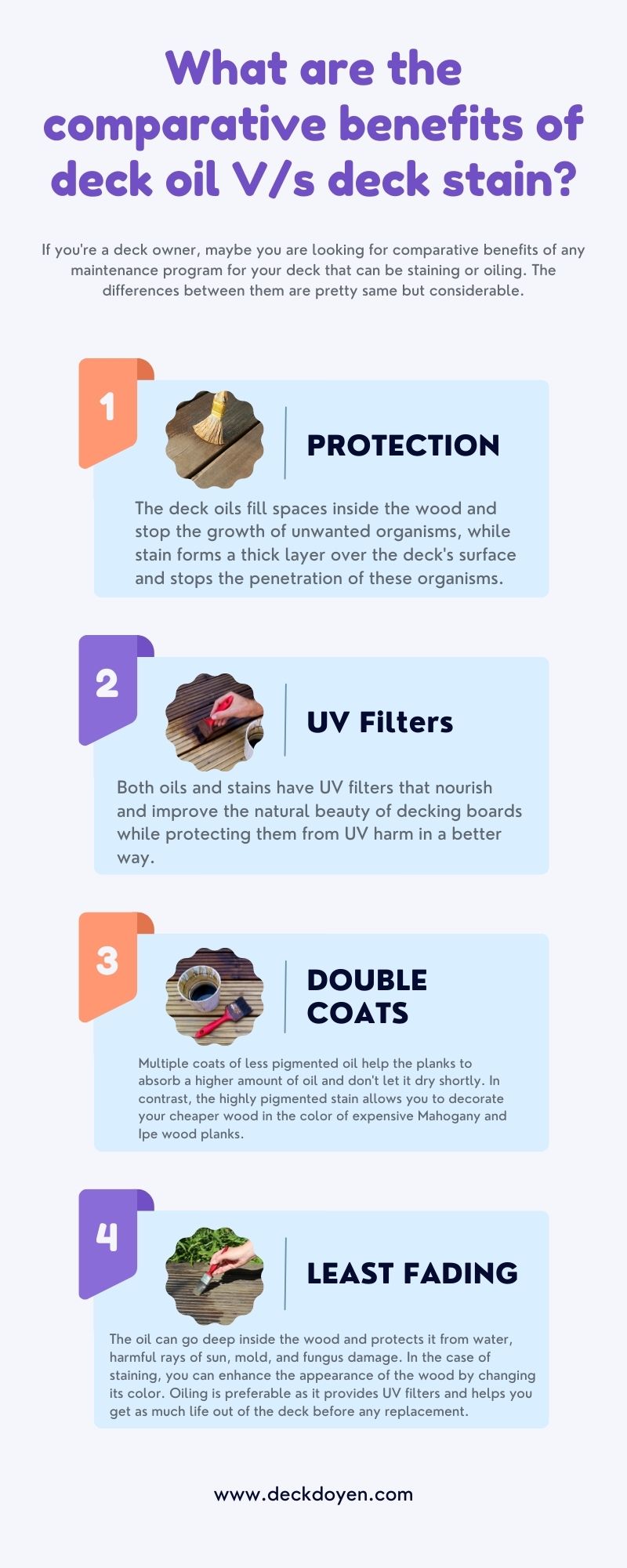
The preventative measures differentiate oil from stain. The oil can go deep inside the wood and protects it from water, harmful rays of sun, mold, and fungus damage. In the case of staining, you can enhance the appearance of the wood by changing its color. Oiling is preferable as it provides UV filters and helps you get as much life out of the deck before any replacement.
Moreover, oils enhance the natural color of your deck. On the other hand, a stain will completely transform its look. It contains pigment and is featured to change the color of your timber. Contrarily, the oil has less pigmentation, which makes it less durable against the stain. Hence, the stain will last longer because of high pigmentation.
Which One Is Best, Deck Oil And Stain?
Like every other maintenance liquid, deck oils and stains have many benefits. However, both act differently to protect our deckings. Where deck oil is good in water resistance, the deck stain is better in coloring. Hence, both are good in different ways, and it is tough to decide which is best. That’s why I have compared the advantages of deck oil and stain, so Let’s have a look.
Algae And Mold Protection:
There are many pores and unfilled spaces on the deck floor. These spaces can be the house of algae and molds.
Read More: Should You Install Deck Posts in Concrete or On Top?
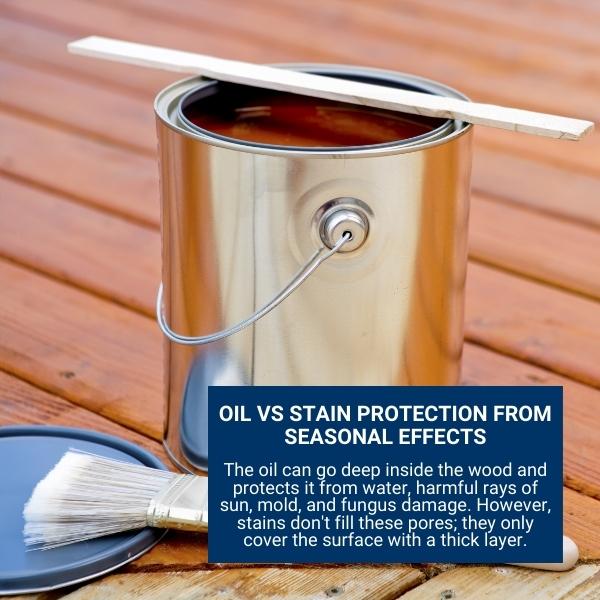
Deck oil fills these spaces and stops the growth of unwanted organisms. However, Stains form a thick layer over the surface of the deck. It stops unwanted organisms, termite fungus, and algae from penetrating the wood. Besides, oiling the deck needs regular washing and cleaning.
Pigmentation:
The stain has a higher amount of pigmentation than oils. Thus, it enables you to change the color theme of your deck.
Well, the deck has very little pigmentation. That’s why you don’t need to do extra scrapping of color before new staining. Some oils have staining ability but will not color your floor as a natural stain.
Traction:
The footing experience on the deck floor matters the most. That’s why the traction effect of oil is always desirable for homeowners. The wood absorbs oil and makes the natural grains shine away. On the other hand, paints provide a slippery floor by covering the floor with a top layer. Regardless, oil is better for barefoot walking decks.
Water Resistance:
Moisture can destroy your deck wood and planks. However, oil is non-dissolvable. That’s why natural oils are the best source to protect your wooden floor. Oil fills the spaces and stops water from taking place in them. On the other hand, stains only layer the surface. Thus, it’s less water resistant than natural oils.
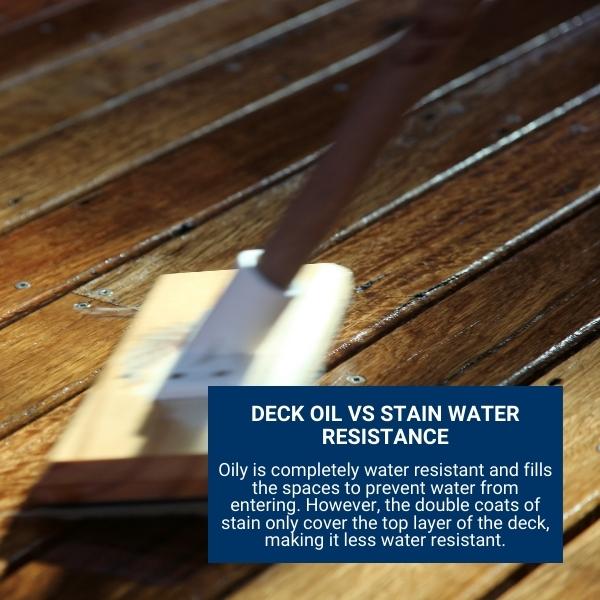
Replenish Through Natural Oil:
Sometimes the planks of your deck start dusting, or termites start destroying it. In this case, deck oil is the best option to replenish the wood. It fills the pores, spaces, and cracks in the surface and renews them. On the other hand, the train is just a coloring agent, and it doesn’t help with repairing cracks.
Read Also: Should You Power Wash A Deck?
Easy To Apply:
For applying stain, you need to scrape the wood to remove the traces of the previous color. However, in the case of natural oils, you just need to open the box and oil your deck. Unlike stains, you don’t have to do any preparation and pre-oiling tasks other than cleaning the excess dust. Hence, the application of deck oil is simple and quick.
Long-Lasting:
Both stain and natural oil increase the durability of your BBQ deck floor. However, pigmented liquids are more lasting than oils. It would be best to re-apply deck oil every 6 to 8 months to keep your floorings fresh. On the other hand, stains last for one to two years easily. You don’t have to restrain your floor unless it starts to fade or dust from the surface.
UV Protection:
UV radiation harms your deck wood like they harm your skin. Deck oil can protect the wood from sun rays and shattering. However, mind that dark coloring oils are better for UV protection than light shading oils. Stains also protect your floors and wood by reflecting the UV rays.
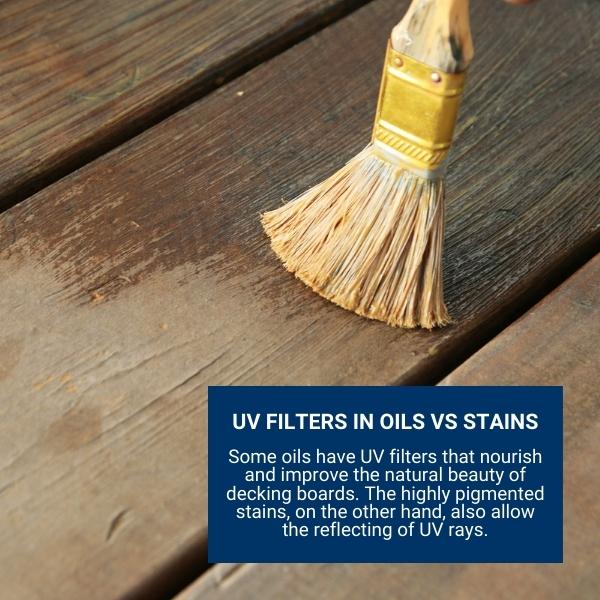
Fast Drying:
Oils are always slow in air drying. Still, it doesn’t take longer than a night to dry the deck oil. Just oil the floor in the evening, and your deck will be ready for footings by the morning. However, stains have a quick drying ability. You can apply paint anytime, and after 4-5 hours of drying, your floor will be ready for footings. However, the application may take some time against deck oil.
What Are The Pros And Cons Of Deck Oil And Stain?
Regardless of the advantages, deck stains and oils have some disadvantages too. These pros and cons help us decide which one is better for which place.

So, why not dive into the pros and cons of deck oil and stain to decide which is best?
Pros Of Deck Oil:
- Excellent coverage, often ranging from 8 to 12 square meters per liter. Some deck oils have a coverage area of up to 25 square meters per liter.
- Darker-colored decking oils, on average, provide superior UV protection than lighter-colored or clear decking oils.
- It is waterproof and aids in replenishing the natural surface of the wood, keeping it healthy and supple.
- Oils act from within the decking boards to help prevent cracking, splitting, and warping.
- Oils are simple to apply, clean, and maintain.
- You don’t need to sand the board to bare wood before applying a replenishing or maintenance top coat.
- Decking oils will not cause the wood’s surface to crack, peel, flake, or blister.
- Deck oils are much less slipping than paints because they do not cover the wood with a plastic-like layer, allowing the organically irregular grain of the wood to give a firm grip.
Read Also: Should A Deck Be Level Or Sloped?
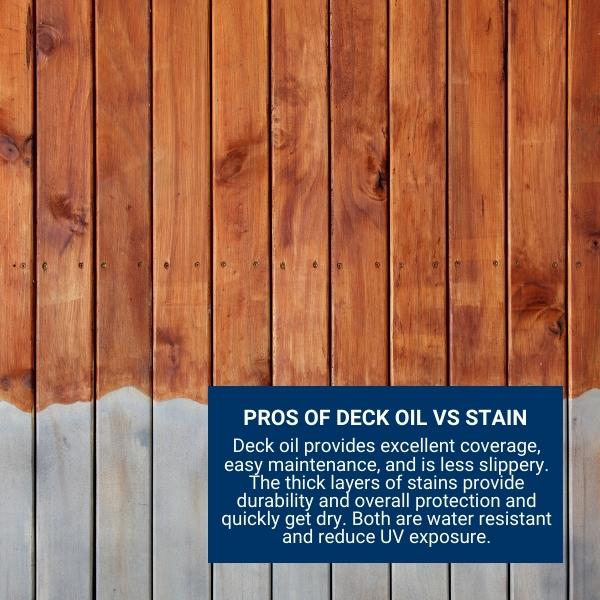
Pros Of Deck Stain:
- Coating stains form a plastic-like film or covering that seals the deck. It applies a durable covering to the surface, protecting the decking timbers from weathering and foot activity.
- The dyes in deck stains reduce the UV exposure, thus protecting the wood from the sivering effects of the sun’s UV rays.
- Decking stains look wonderful on decking accessories like handrails and spindles.
- Stains give enough color spread and depth.
- Many stains dry faster, are water resistant, and may be walked on in a matter of hours.
- Deck stains make it harder for mold and algae to grow on the deck’s surface.
- It gives an esthetic and new look to your deck after every coat.
Cons Of Deck Oil:
- All decking oils are not appropriate for exotic hardwood decking as Iroko, Balau, Massaranduba, Teak, and Cumaru as they have an oily and grainy consistency. Highly refined or thin decking oils may be necessary.
- It would not be best to overcoat your floor with a decking stain or deck paint unless the decking has been thoroughly scraped or left to weather for several years.
- The previous coating color of your floor changes the shade of the new color to some extent. It implies that the final finish of the decking may differ from the color represented on the tin.
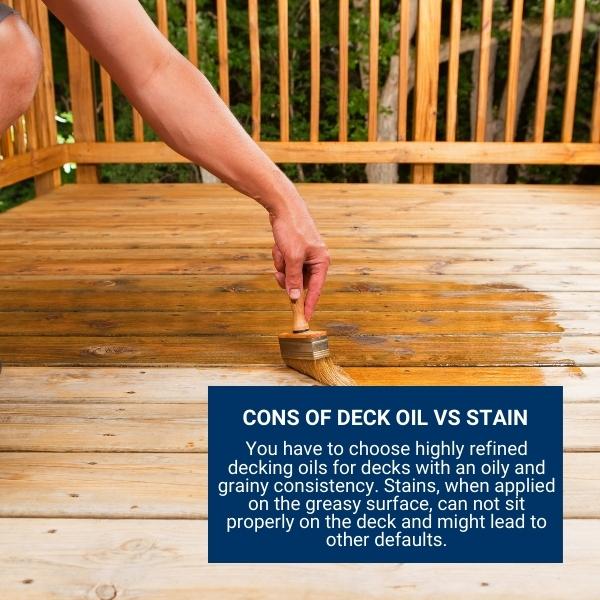
Cons Of Deck Stain:
- The pigmented coating between the timber and the surface may lessen the sight of the natural wood.
- It can begin to peel, break, and flake if the barrier is disturbed and let water penetrates the stain.
- A new flooring solution application to curved decking is challenging to remove.
- You can not use it on deck floors that you have already greased. Any oil in the decking may reject or prevent the deck stain from adhering.
- Iroko, Teak, and Cumaru are a few examples of dark, naturally oily, and exotic hardwood flooring that may be troublesome to stain. It also includes Balau and Massaranduba, which must get three to six months to weather naturally for staining. As surface grain expands and some of the natural oils require dissipation.
Conclusion:
Whatever you want from your deck will determine whether you should oil or stain it. A stain will enhance the esthetic appearance of the deck, but oil will help it last longer. I believe greasing is better because timber decking is a massive investment for desirable vitality out of it for a long time before replacing it. Keeping the wood in decent health will also assist its look. One of the huge disadvantages of oil is that it causes the timber to go silver when exposed to sunlight. You may restore the natural look of your decking by applying a steam cleaner or selecting a decking oil with UV inhibitors.
Read Also: Deck VS Curb Mounted Skylight: Differences, Costs, Pros and Cons
So, deck oil and stains have many pros and cons, which you must not ignore. You may decide how you want your deck to look and maintain it. Just ensure you don’t apply stains and oils alternatively. Stick to one method of deck maintenance. If you choose to oil the wooden floor, keep oiling it repeatedly. However, once you oil it, you won’t be able to stain it because it won’t work on oil. Though oil doesn’t beautify your deck, it has more benefits. Hence, you better make the right decision.
Faqs:
Q.How Often Do You Need To Re-Apply Oil Or Stains?
If you are using oil for your deck, it should be safe to apply it once every six to eighteen months. While on other sites, you’ll only need to re-stain the wood once every 2 to 3 years.
Q.How Long Do Decking Oil And Stain Take To Dry?
On average deck, oil takes about 4-24 hours to dry. Most deck stains will dry between 1-12 hours. Temperature also affects drying time. In cold weather, it will dry slower as compared to hot weather. So, apply accordingly.
Q.Do I Need To Clean My Deck Before Staining Or Oiling?
You must remove dust, dirt, or contaminants from the deck surface. You can use a deck cleaning product or a decking brush to scrape off the dust. You allow the oil or stain penetrates maximum to provide a beautiful and durable finish by cleaning.
Q.What Happens When You Do Not Oil Your Deck?
If you do not oil your deck, you may face some unpleasant consequences. The wood will start losing its color and will fade. It will be the food of mold, fungi, and moisture that can cause health hazards. So if you notice any signs, you need to think about oiling your deck.

